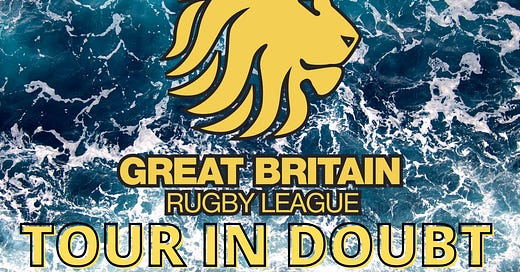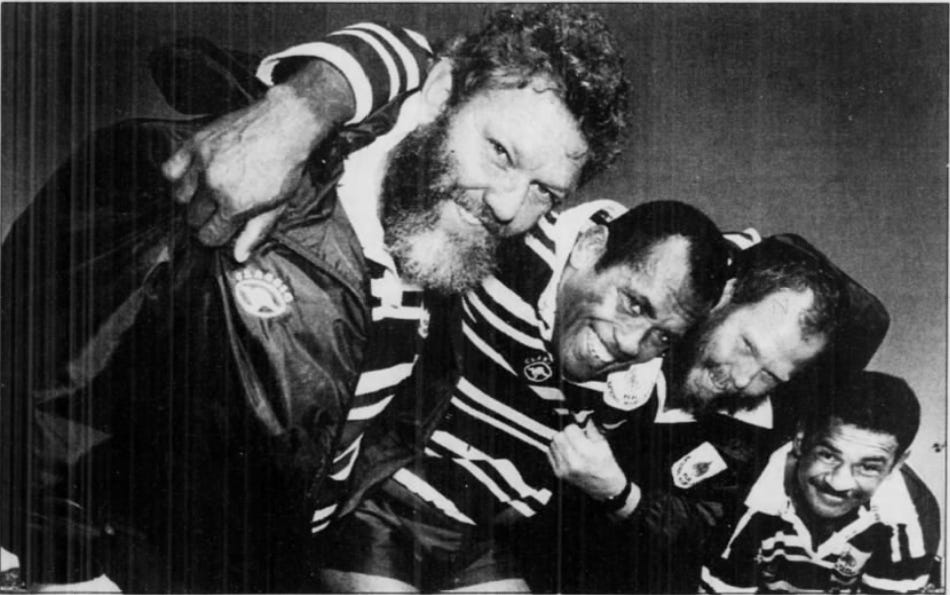July 25, 1996: Same shit, different century
25 years ago, the Great Britain tour is in doubt just a couple of months out from its scheduled start. Sound familiar?
That’s the thing: nothing really changes in rugby league.
Twenty-five years ago, Great Britain were supposed to be touring New Zealand, Fiji and Papua New Guinea. Not Australia, because the ARL had won the first Super League court case.
Yet about as far out from the tour as we are now from the 2021 World Cup, it was in doubt. NZRL chairman Graham Carden - who went on to be disgraced as a con man - denied there were any problems but if you read Two Tribes, you’ll learn that Maurice Lindsay wanted to call it off.
Now we have Australia and New Zealand seceding from the World Cup and the same distance out from the tournament, there is doubt it will proceed.
This is why, 40 years after I first became a rugby league fanatic, I’m ready to check out. Of course I have a book to finish and I have these posts to do every day and I have a merch company and I will keep doing those things as “work”.
But writing this book has solidified in my mind that rugby league has a birth defect. It was born to provide rugby for people who could not otherwise afford to play and it is still selling things - five generations later - to the descendants of those people.
It was not created as a separate sport, it was born as a social movement to empower the working class. In less self-important terms, that’s a charity that people in charge can openly siphon money from.
How did it ever have a hope of competing with sports with a broader socio-economic and geographic spread when it defined its very existence by being a sport for the poor?
I explained it last night to my wife this way: what if you set up a rival house committee for our apartment building just for renters? In five generations, would it have more power than the main house committee? How many renters would have become owners?
Rugby league’s example indicates: not enough. Not enough rugby league people have been upwardly mobile over the generations since 1895 to lift it out of the mire of being rugby for poor people.
In the end, following rugby league as a sport rather than just your team hurts too much. I’ve got a life to lead. As this post shows, nothing changed in this last generation that I’ve experienced, riding every false dawn and feeling every disappointment acutely.
We’ll see what happens with the World Cup.
But my passion for the game is just about gone.
PROBLEMS IN PARADISE
Sydney Morning Herald, Friday July 12 1996
By STEVE MASCORD
IN its short history, Fijian rugby league hasn't had a better day than October 8, 1995.
In the smallish Yorkshire town of Keighley, the covers came off four years of toil by a group of hardy officials led by an Australian, Bob Abbott, and a Fijian named Culden Kamea.
On an almost cloudless, vaguely cool day, 4,845 northerners packed the tiny Cougar Park and sat gape-mouthed as the Fijians made football fun again with a 52-6 cakewalk over South Africa.
Flick passes, spiral passes, tunnel ball moves, crunching defence and general anything-goes football made them instant heroes.
It was a World Cup debut full of athleticism and uncanny skill.
Just five years before, league had been a game on television and nothing more in the island nation. The rise since had been nothing short of breath-taking.
Most of the World Cup squad had already played club football at various levels in Australia.
A couple of hidings were to come, but on that day in Keighley the efforts of ARL development manager Abbott and his local operative, Kamea, were rewarded. Unfortunately, by then they were no longer on speaking terms.
Fijian coach at the World Cup, Graham Murray, recalls players who were "polite, almost to the point of being embarrassingly polite".
"As a Winfield Cup coach, I'm used to having to yell to get attention in a dressing-room," he said this week. "With these guys, you stand up and they fall silent. They don't say anything, touch anything, do anything but listen.
"They have a little bit of trouble being on time for things like the bus or training, but you don't get mad with them. They're on Fiji time.
"The good thing about the South Africa game was that they were playing a team on their own level and showing people who had never seen Fijians play league before what they could do."
Kamea met Abbott some time in early 1991, in Sydney.
The Fijian had been hosting another Queenslander, friend Ken Harvey, in Suva and during the drive from Nadi the Australian had noticed hundreds of children playing touch football in parks.
"These kids," Harvey told Kamea, "would be ideal for rugby league."
Harvey organised a meeting in Sydney between Kamea and Abbott. "I had toured with the Fijian rugby union side as a commentator and I knew the players, I knew Noa Nadruku," Kamea said.
It's history now that he and friends enticed four members of Fiji's defending Hong Kong Sevens rugby union side to play in the very first Fijian league side at the 1992 World Sevens.
The 'Bati' (Warriors) beat Canberra and, in the final of the Plate competition, downed Gold Coast 18-14.
Major General Sitiveni Rabuka was there to see it, and led them in a pre-match prayer.
Kamea said this week: "I never really thought of taking it any further than the Sevens, but when we got home there was such incredible interest and enthusiasm."
With the ARL's resources, Abbott's direction and the expertise of the Narrabeen Rugby League Academy, Fiji became a 13-a-side rugby playing nation.
To date, 40 players have joined clubs in Australia. Four are first-teamers in the European Super League. Regular games against sides such as Queensland Residents and other islands culminated with a remarkable win against Test-playing France, in Suva in 1994.
"The ARL underwrote all those things," Abbott points out.
As the Super League war raged in Australia last year, Abbott flew to Suva to help Fiji prepare for the Centenary World Cup. He took with him former Australian Test fullback Greg Brentnall who, it was intended, would be coach.
At the same time, Super League chief executive John Ribot, director Mai Meninga and New Zealand chairman Graham Carden were island-hopping in a chartered jet.
They landed in Western Samoa and Tonga, made local officials an offer they couldn't refuse, and moved on.
It was an audacious, and successful, manoeuvre at a crucial time in the war to isolate the ARL internationally.
"When I got there, I felt something was different," says Abbott now. "People weren't being the same to me, they avoided various questions and when I asked Culden if he had spoken to Super League, he said 'No'. But I knew he had."
Abbott, the "Bishop" of league in the South Pacific, was losing his congregation at a rate of knots. In Kamea, he was about to lose a friend, too.
"I saw John Ribot during the trip," recalls the ARL man, "and I said 'there is no way you can provide the people with expertise that this country needs'. He said: 'We'll buy them'."
Kamea denies holding secret negotiations with Super League. He says he was told Ribot, Meninga and Carden were on their way and agreed to meet them.
Kamea and Rabuka, by now president of the FRL and Prime Minister of Fiji, met Abbott the night before the Super League trio was to arrive and solemnly told him what they would say to the rebel officials.
"We were going to ask for a certain financial input and if we didn't get it, we would stay with the ARL," said Kamea. "Bob knew the score."
Ribot, Meninga and Carden met for five hours at the Suva offices of Coca-Cola where Kamea worked on a Saturday in June. They outlined "the vision" and Kamea, FRL director Michael Ah Koy and an adviser, Queensland investment banker George Speight, had decided to say "no".
"Then John Ribot came back into the room, offered us the World Nines for the next five years and first call on any Super League franchise set up in the South Pacific before the year 2000," Kamea said.
"This year, the Nines put $1.3 million into the Fijian economy and when your league president is also the Prime Minister, you tend to take those things into account."
Abbott has set up a new six-village ARL competition in western Fiji and it is from that competition the team which takes on Australia at Marathon Stadium tonight is drawn.
The Super League-aligned FRL has, says Kamea, gone from eight clubs with one team to 12 with two.
There used to be eight schools playing, now there are 16, each with two teams.
When an official of the ARL competition, Elvis Hill, slammed tonight's Test, he was sacked. The ARL clearly expects a political pay-off for the money they've spent in Fiji. They have to deliver the Test they promised to their star footballers.
Kamea says he has nothing against Abbott or his National Rugby League of Fiji. He just doesn't think these players should be pitched into a game against Australia.
"After we made our decision to go to Super League, the Prime Minister said the ARL's input on the western side of the island was welcome," he said. "It's international aid, it's good for the youth.
"But we did not say the ARL could come in and pick a Fijian team. Bob has overestimated the length of rope the Prime Minister gave him."
Abbott says the Fijians sold out on those who gave them life and should expect no favours.
"We have to do the right thing for the ARL, we didn't tell them to join Super League," he said.
But Kamea is disarmingly short on Super League rhetoric and anti-ARL venom when he discusses the options the FRL had.
"What were we to do, say 'no'? The ARL offered to double the money they were giving us already and when we worked out how much the Super League deal was worth, it was twice that again.
"We were going to say no but if we had Super League would have come in and over-run.us anyway. We didn't stand a chance."
Just like the Fiji Wau, pawns in an ugly war, tonight






Steve, I feel the same way about RL now. I'm 57, been a fanatic for 46 years since discovering it at primary school in Sydney aged 11, have sat through the insane SL War and all the idiotic administration over the decades, plus the shafting of my beloved North Sydney Bears and the forced merger of loyal ARL clubs while disloyal teams like Cronulla and Penrith and Canterbury march on … but V'landys and Gould and the NRL clubs' knifing of the 2021 RLWC really is it for me. It the World Cup is cancelled or even postponed, I'm walking away … and it makes feel sick to say it